Table of contents
Brand Reputation Management: 6 Expert Tips for 2026
Did you know that nearly 93% of customers take the time to read online reviews before making a purchase? Yes, it’s crucial to have a positive reputation to succeed. That’s why I have 6 powerful tips to help you become an expert at managing your brand’s reputation.
- Brand reputation management is all about shaping how others perceive your company. It involves monitoring online reviews, responding to customer feedback, and shaping your brand image through daily efforts, such as marketing and customer service.
- A strong brand reputation management strategy combines several elements: managing online reviews, keeping an eye on social media conversations, improving customer care, handling crises, and collaborating with influencers.
- Effective reputation management requires a balance of proactive actions (highlighting what makes your brand great) and reactive actions (responding quickly and thoughtfully to negative opinions).
- To implement your strategy and stay in control of your brand’s online reputation in real time, you’ll need an advanced social listening tool that tracks feedback across channels, analyzes sentiment, and performance.
Let’s dive in!
What is brand reputation management?
Brand reputation management is taking control of how people perceive and think about a brand. It involves monitoring what people say online and offline and ensuring the brand has a positive image.
By managing brand reputation well, businesses can protect their image, keep customers happy, and stay ahead of the competition.
Brand reputation management efforts include:
- Monitor brand mentions, reviews, and feedback to stay informed about the public’s perception of your brand.
- Responding promptly and professionally to customer inquiries, comments, and concerns on social media, review sites, and other platforms.
- Encouraging positive reviews by providing exceptional products and services, as well as engaging with satisfied customers.
- Maintaining a consistent brand voice and message across all marketing channels and customer touchpoints.
- Addressing negative feedback and criticism in a proactive, empathetic, and solution-focused manner.
- Developing and implementing public relations strategies to maintain a positive brand image, including managing potential crises.
- Collaborating with influencers and industry experts to build a positive brand image.
- Continuously analyzing customer feedback and using the insights to improve products, services, and overall brand reputation.
The goal is to build customer trust, address problems or negative feedback, and handle crises effectively.
6 Tips for effective brand reputation management
Managing brand reputation looks like one tough cookie. Thankfully, I prepared a short guide to brand reputation management!
You don’t have to follow every guideline we listed. Choose the ones that suit your needs the most and are relatively easy to implement.
Ready? Here we go!
01 Track online conversations and brand mentions
Brand reputation management starts with brand monitoring!
To be able to react to online mentions, your PR team has to be aware of everything that is being said about your company, product, or service online.
You can monitor mentions you’re interested in manually — type the name of your company into any search engine and examine the results one by one.
This approach to brand reputation management has one benefit — you don’t need to pay for any additional tools.
The list of disadvantages is a bit longer. For starters, manually searching for online mentions will take a lot of your time. You risk missing some crucial comments. That might spiral and hurt your brand reputation in the long run.
Moreover, many brand monitoring tools will offer additional analytics metrics that will help you measure the results of your marketing campaign, your hashtag reach, or sentiment around your brand.
Here you can see Nike mentions detected by the Brand24 tool:
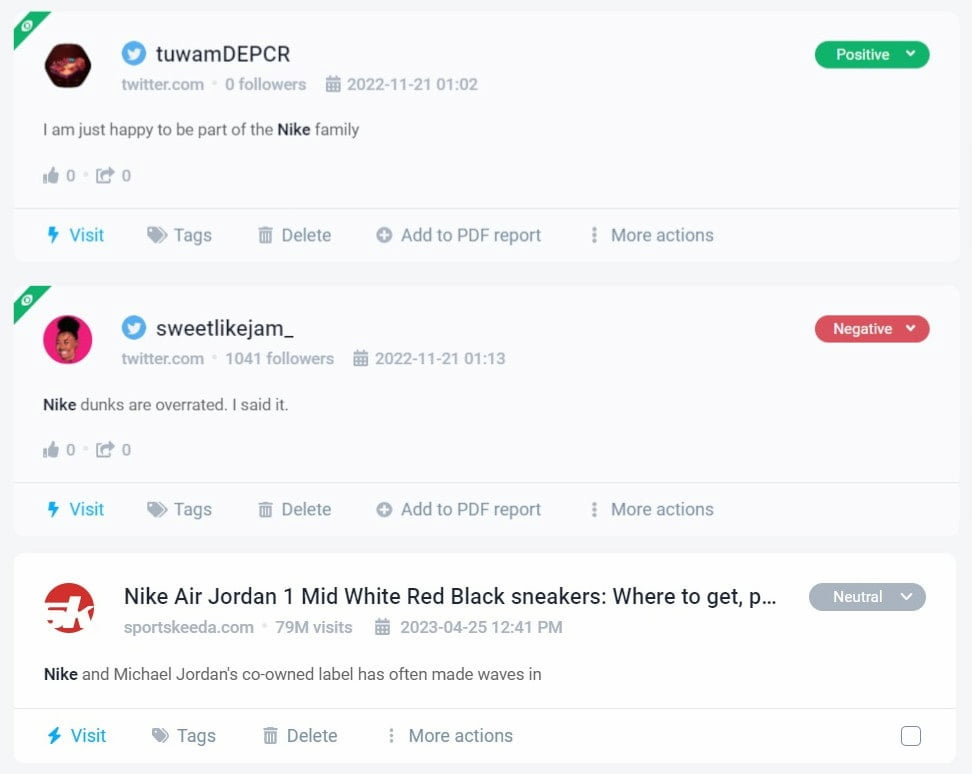
Moreover, Brand24 offers multiple AI-powered features. One of the most interesting is the Anomaly Detector. What’s all about?
First, check the following chart presenting the volume & reach of mentions regarding Nike:
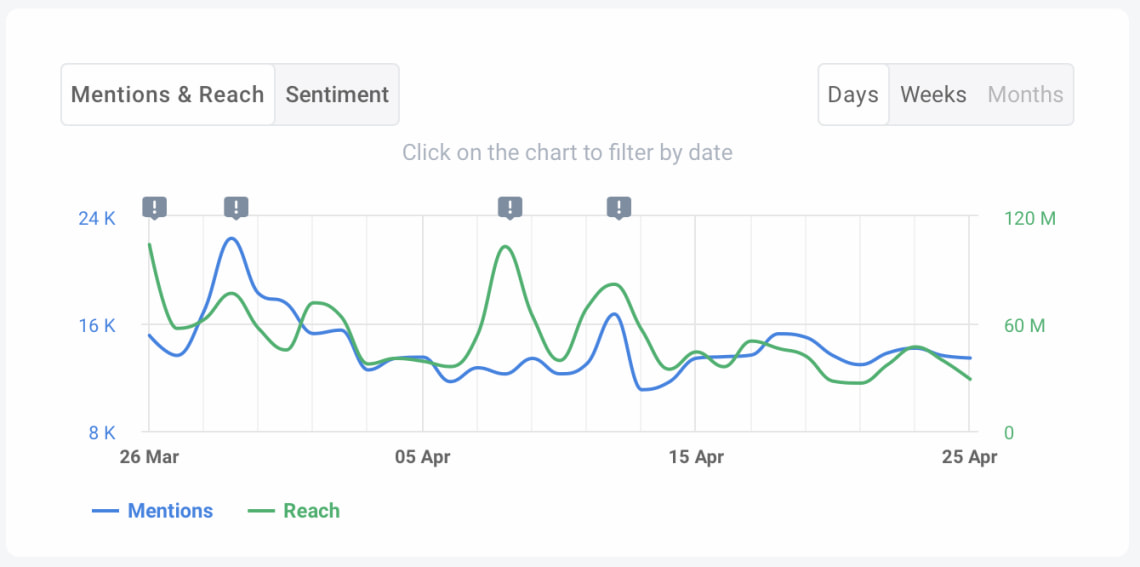
As you see, there are exclamation marks above each of the chart peaks.
This means that the AI Anomaly Detector identified unexpected behaviors, such as unusual spikes in mentions. At the same time, it uses artificial intelligence capabilities to find out what caused the detected anomalies.
Let’s click on one of the exclamation marks.
The Anomaly Detector reveals the increased volume of discussions & higher level of negative sentiment are related to women’s sizing and skimpy swimsuits for female athletes.
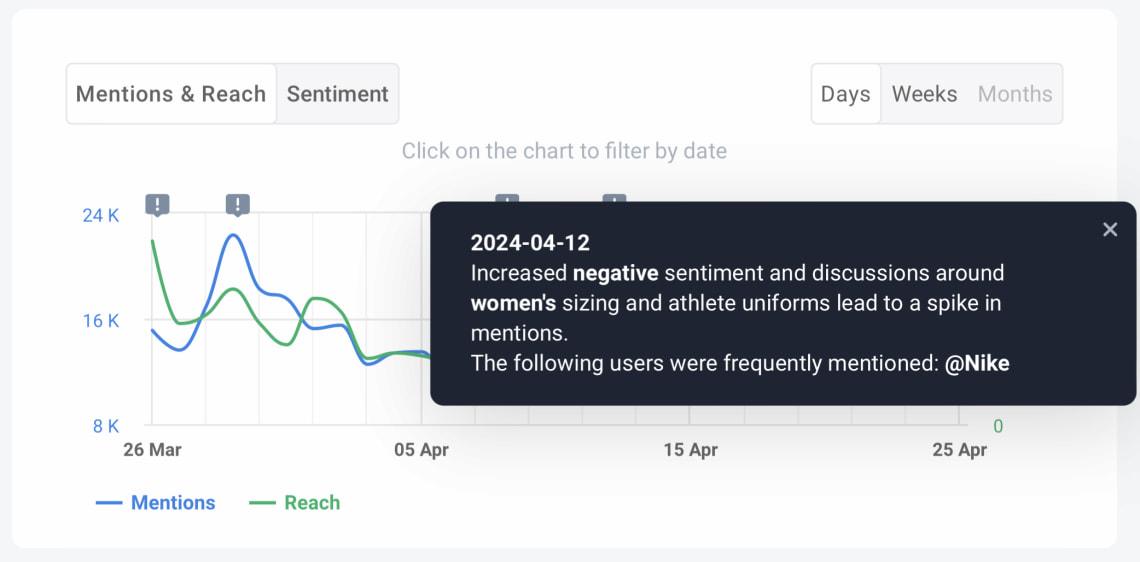
02 Monitor customer reviews
According to research provided by Bright Logical, 86% of consumers read reviews for local businesses (including 95% of people aged 18-34).
We live in a time of massive advertising, and it’s impossible to verify if these ads are describing products or services fairly or not. Due to much false advertising, people limited their trust to businesses promoting their products or services.
That’s why review sites are so popular.

Nowadays, people much more trust online reviews written by other customers rather than regular ads. It happens because people are looking for real, honest, and unfiltered reviews and opinions made by real users and based on their experience with the brand.
91% of 18-34-year-old consumers trust online reviews as much as personal recommendations.
That’s is why online reviews are crucial for your brand reputation – they are an excellent way to build a more significant social reach and establish trust, which converts potential customers into paying customers.
Feedback and business improvement
Another benefit you get from online reviews is feedback about your product. That’s why you should pay attention to what people are saying about you.
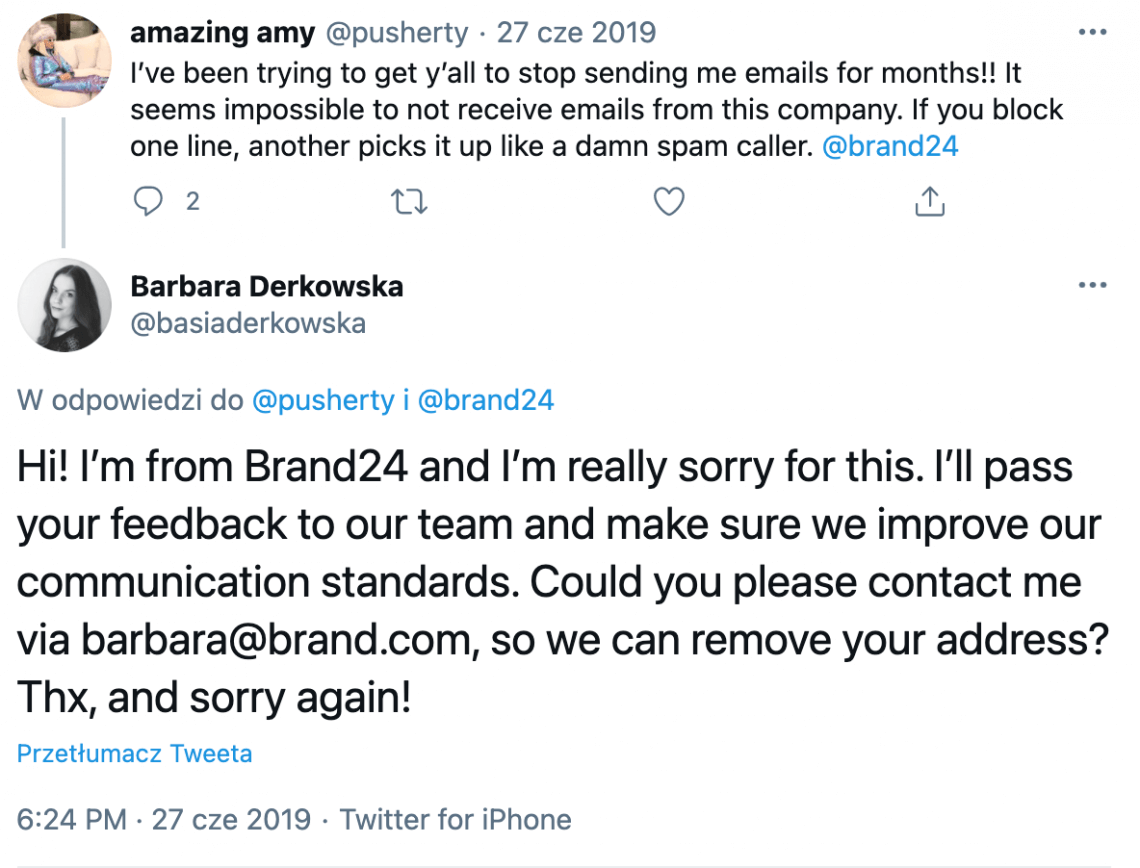
Even if a review is negative, you should read it carefully and try to draw conclusions. Negative surveys can help your business by showing you the weakest links in your product or service. Thanks to that, you can correct all the mistakes and improve your business according to your customers’ desires!
Monitoring reviews and upgrading your service will lead to growth in sales, and will help you determine the priority of feature development
What’s also essential – negative opinions may show you in a favorable light! It all depends on how you respond to them. If you admit that you’ve made a mistake, apologize and show that you drew conclusions from the review, people will accept it.
Show your human face, let people know that there is a real person on the other side of the screen. We are all human, and making mistakes is a human thing. Your reaction is most important.
03 Respond promptly to customer concerns
First, you need to identify urgent customer concerns that require immediate attention.
You can do it by sorting important negative mentions. Also, keep an eye on overall brand sentiment. Sentiment analysis will inform you whether any negative trend appears.
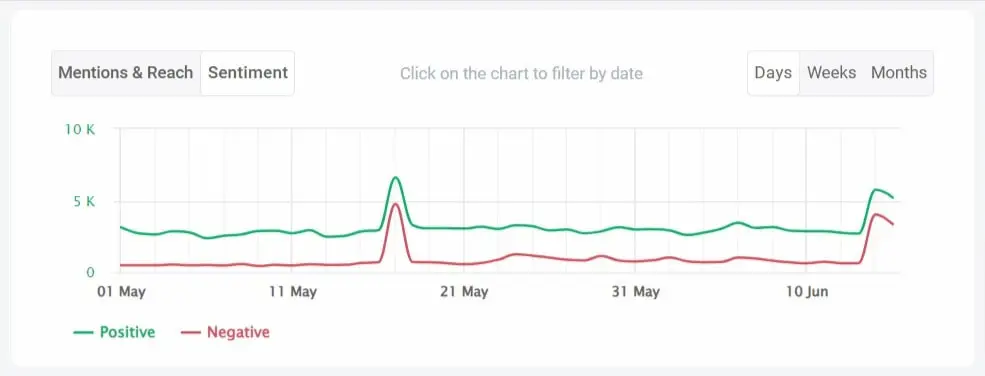
It is a good idea to conduct a topic analysis to identify which topics are causing customer problems.
Netflix has recently introduced new guidelines on password sharing, which have not gone down well with its customers.
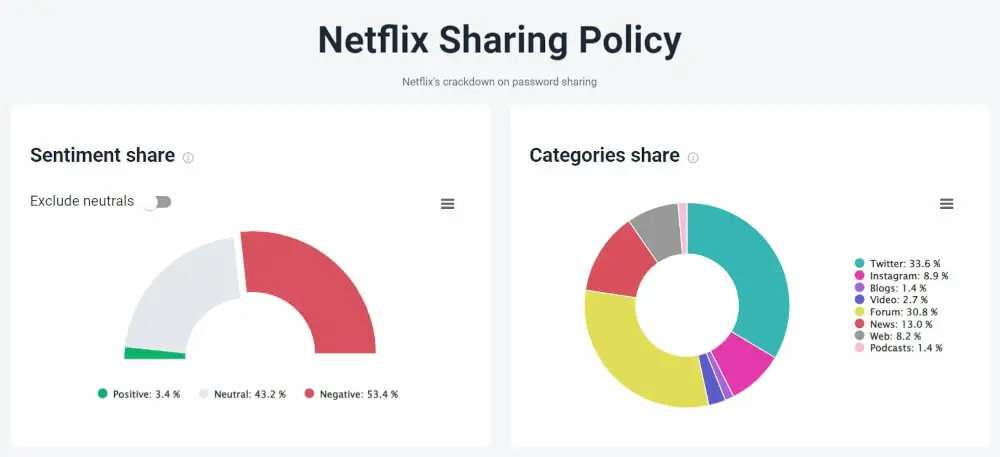
After detecting the issue:
- Respond to the customer promptly.
- Let them know that you are working on finding a solution.
- Show empathy and understanding toward their frustration or dissatisfaction.
- Keep the customer informed throughout the resolution process.
- Once you have all the information, it’s important to give a clear and easy solution that addresses the person’s concerns.
- After successfully resolving the customer’s concern, follow up with them to ensure their satisfaction and check if they require any further assistance. This shows that you care about their feedback and want to make sure they’re satisfied in the long term.
Check: The Best Customer Feedback Tools
04 Build a positive brand reputation proactively
It’s crucial to maintain a positive brand image. Here are some great tips that will help you do that:
- Promote positive customer experiences
- Boost customer satisfaction
- Provide an excellent customer experience
- Build an engaged community
- Collaborate with influencers and industry experts
Promote positive customer experiences
One way to build customer loyalty is by encouraging them to share their experiences through reviews, testimonials, or surveys.
These testimonials can be used to showcase positive experiences on your website, social media channels, and marketing materials, highlighting your value.
Discover our client’s success story — read the case study.
Another effective method is to create a loyalty program that rewards repeat customers with exclusive discounts, offers, or other benefits. The goal is to make them feel valued and incentivized to continue doing business with you.
You can also surprise and delight your customers with personalized thank-you notes or small gifts to show your appreciation.
Check: How to Get Customer Testimonials?
Boost customer satisfaction
Monitoring customer conversations should lead to improving customer satisfaction.
Happy customers stay longer with your company and provide long-term revenue.
Discover our client’s success story — read the case study.
Customer loyalty can provide a perpetual motion to your company. Not only will they form a loyal customer base. Satisfied customers will spread the word about your product or service. And there’s nothing like word-of-mouth marketing
When it comes to managing your brand reputation and boosting customer satisfaction, time is of the essence. Try to resolve your customers’ issues as fast as possible.
To do that, you have to be aware of the problem. That’s why monitoring mentions around your brand is so crucial.
Furthermore, you should offer multiple levels of communication. Your clients should be able to choose the channel that suits them best, for example, social media, live chat solution, email, or phone.
Provide an excellent customer experience
Customer experience is slowly becoming one of the most important decision-making factors when it comes to purchasing decisions.
How do you distinguish your customer service from other players on the market?
Firstly, think about personalisation of your message. Every customer expect that their needs will be met and they will get exactly what they need.
You can prepare a dedicated path within your marketing automation tool and try to deliver the most suited message possible.
Moreover, you should ask your customers for feedback and implement the solutions. You can send surveys or just monitor the issues your customers report repeatedly.
It’s important to stay in touch with your customers. Regularly sending newsletters will form a bond between your customer and your company, provided you can deliver content that is interesting.
If you won’t provide en excellent customer service, your clients will turn to your competitors. Don’t worry, in that case, we still got you covered!
Build an engaged community
Social media are the easiest way to communicate with your customers, so it’s crucial for you to know how to improve social media brand engagement. Also, social media platforms like Facebook and Twitter became the first places people go for customer support, product queries, or to say how awesome your brand is.
80% of 18-34-year-olds have written online reviews – compared to just 41% of consumers over 55.
What’s more, people love positive interactions with brands on social media. It makes them feel important as a customer.
According to Sprout Social research, 30% of customers who are neglected by brands on social media are more likely to switch to a competitor.
Social media posts are, by design, public and easy to comment and share, so if you have an engaged community, it’s easier for you to go viral if you post something funny (but related to your brand), or you’ll positively shock people with your world-class customer service as Virgin Trains did:

Collaborate with influencers and industry experts
Teaming up with influencers and industry experts can really elevate your brand. It’s amazing how their support can boost your credibility and build trust with people.
Working with industry experts shows that your brand knows what it’s talking about.
Furthermore, collaborating is like getting a stamp of approval. This social proof convinces others to trust and engage with your brand too.
Working together with the right people is crucial. It’s always a good idea to team up with partners who are in the same industry as you.
How to find proper people? You can use a brand mentions tool for this purpose. Such a tool will list profiles that match your brand.
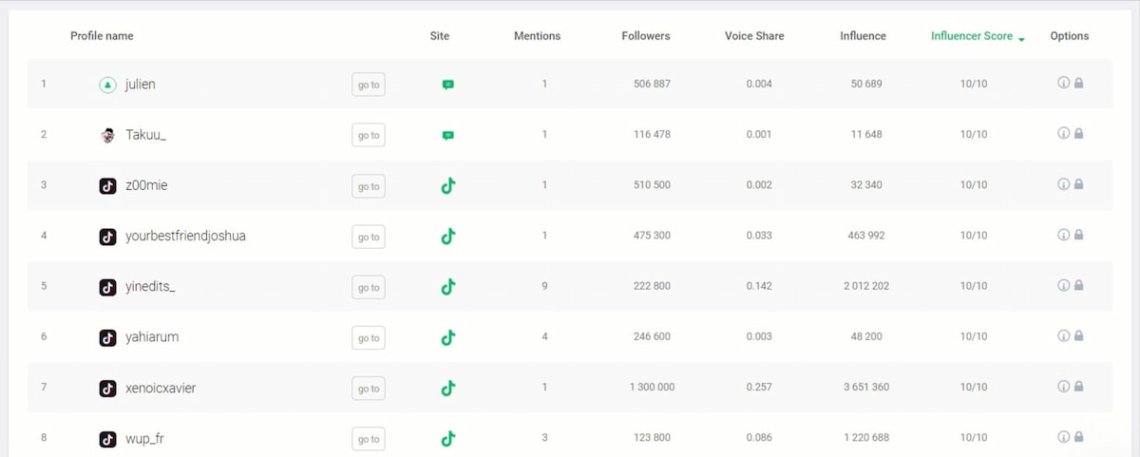
05 Get ready for an image crisis
Effective brand reputation management strategies need to have a brand crisis plan in place.
Why? When a crisis happens, time is crucial.
Having a plan means you can react quickly, deal with the problem, and give accurate information.
Also, a crisis plan helps you manage the situation so it doesn’t get worse. Take a look at our blog post to discover ways to handle a brand crisis effectively.
06 Conduct competitive analysis
Do you know how your brand’s perception stacks up against your competitors?
Conducting a competitive analysis helps you set clear benchmarks for your online reputation management strategy and shows you exactly what you need to do to get—or stay—ahead. It’s a powerful step toward business success, long-term business growth, and maintaining a strong brand reputation.
By comparing your brand with others in your industry, you gain meaningful insights into:
- How consumers perceive competing brands and what they expect brands to deliver
- What drives positive reviews for your competitors—and how you can replicate or improve on it
- Where you stand in terms of visibility and trust across search results and social media platforms
- How strong is your overall online reputation compared to industry standards
These insights help you understand what resonates with customers, identify gaps in your strategy, and discover opportunities to strengthen your position.
Competitive analysis gives you the clarity to outperform rivals, earn more positive reviews, and build a reputation that supports real business growth.
Top online reputation management software to try in 2026
If you want to stay ahead in 2026, choosing the right online reputation management software is essential. These tools help you monitor conversations, highlight positive aspects of your brand, gather customer testimonials, and protect your reputation online across social media accounts, review sites, and the wider web.
The right platform can also help you attract new customers, build trust with potential customers, and support increased customer loyalty.
Here are the top brand reputation management tools:
| Software | Best For | Key Features | Ideal Users |
|---|---|---|---|
| Brand24 | Comprehensive brand reputation monitoring & sentiment analysis | • Advanced social listening • AI-powered sentiment analysis • Event detection• Smart alerts & automated workflows • Mention tracking across web & social media | Brands focused on understanding public perception, improving customer loyalty, and proactively managing reputation |
| Birdeye | Multi-location businesses needing review generation & management | Multi-location businesses, franchises, and local service providers | Multi-location businesses, franchises, local service providers |
| ReviewTrackers | Review collection & analytics from major platforms | • Reviews from 100+ sites • Review trend insights • Experience analytics | Businesses focused primarily on improving reviews and customer experience insights |
Check out our full breakdown of top platforms and features in this detailed guide: The Best Online Reputation Management Software
Is brand reputation management important?
To sum up, brand reputation management is crucial for growing a business. A positive brand reputation builds loyalty and increases customer confidence in your brand and product, which leads to an increase in sales.
In the multitude of daily duties, it can be easy to forget about the importance of brand reputation management, but if you want your business to grow, you need to keep your finger on the pulse.
Lack of brand reputation management can seriously harm your brand and cause damage, which will take a lot of time, money, and effort to repair.
Do you want to know more about media monitoring and online reputation management? We got you covered! Take a look at our Udemy free course in media monitoring!







